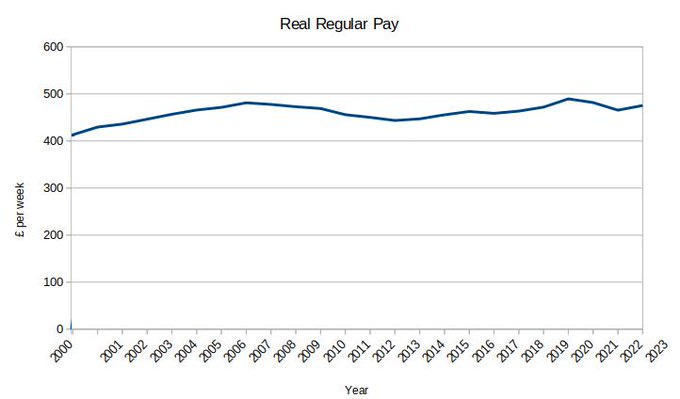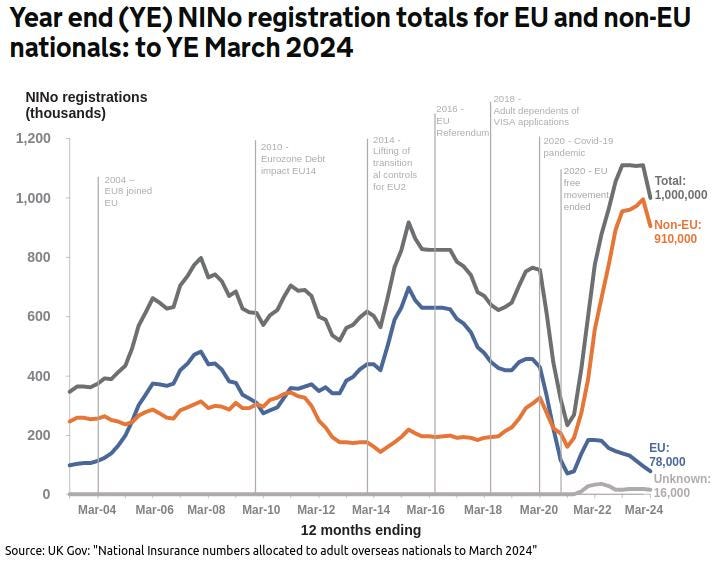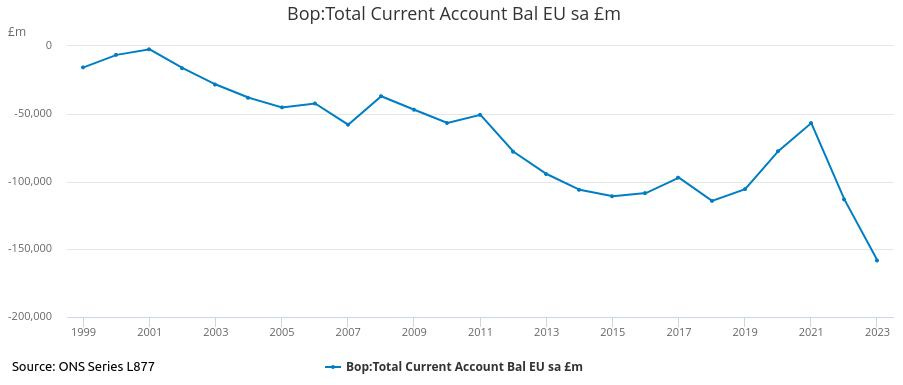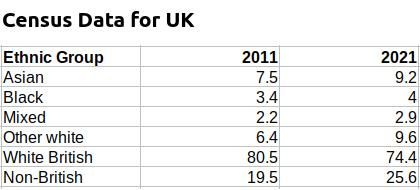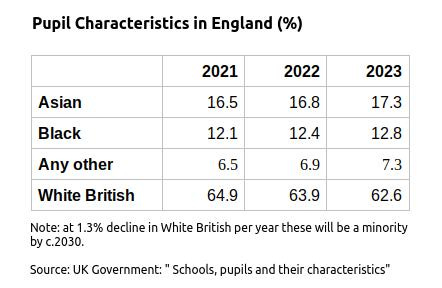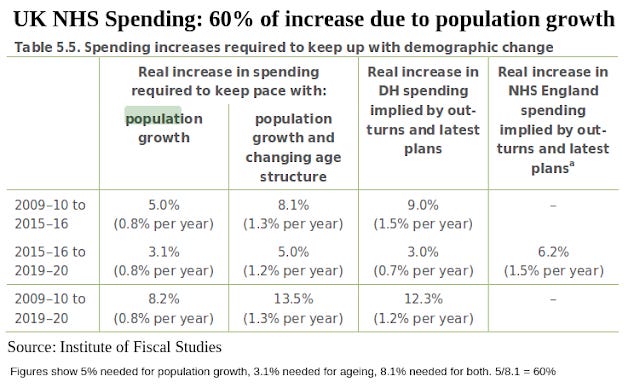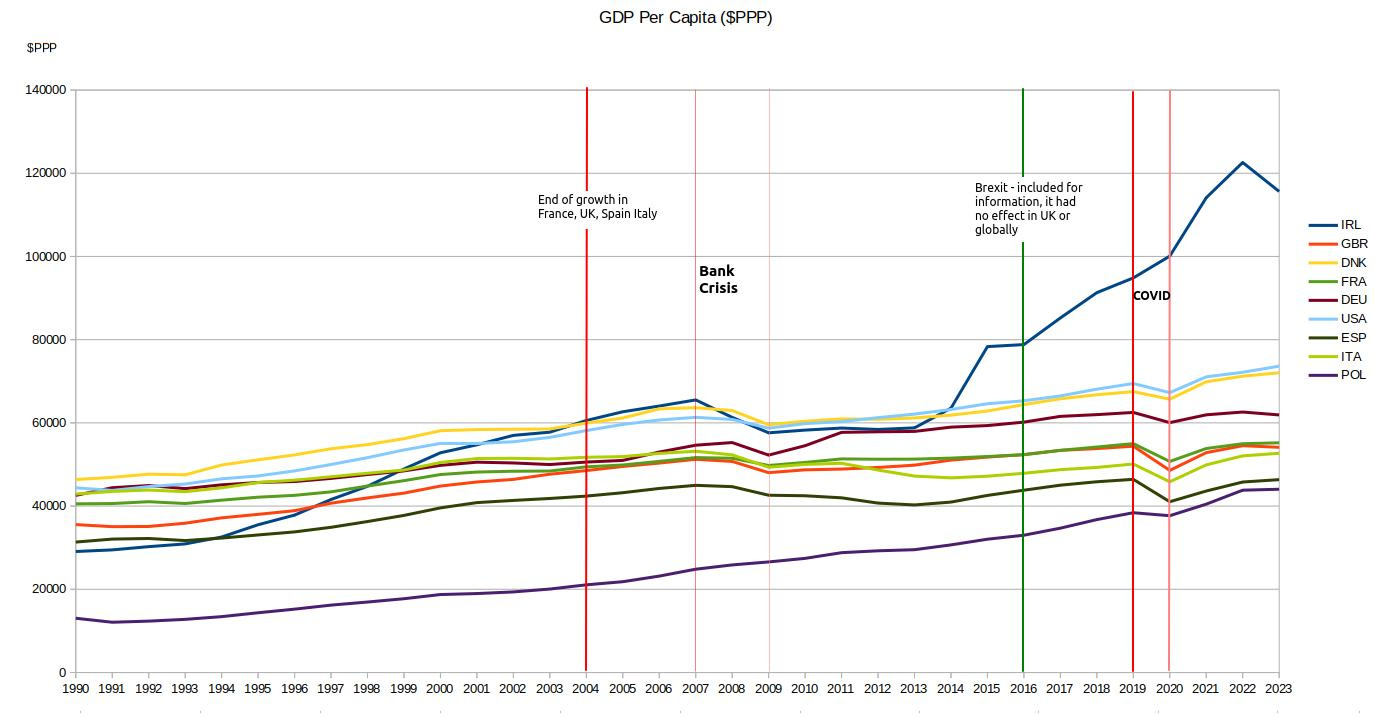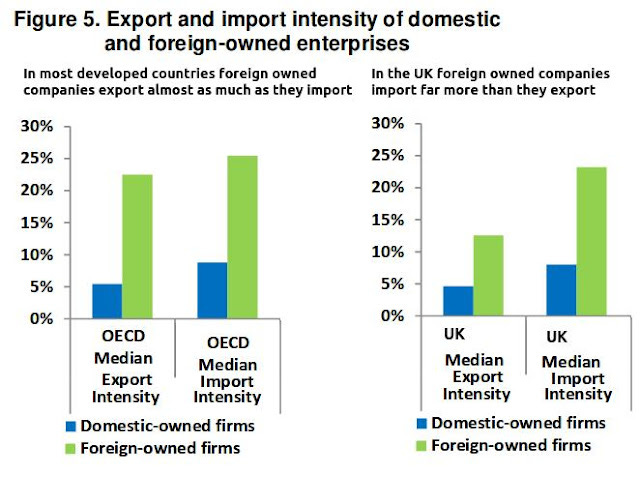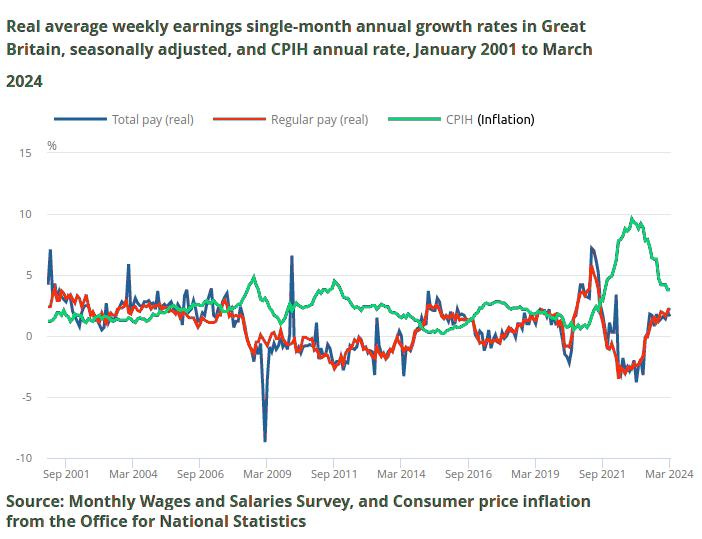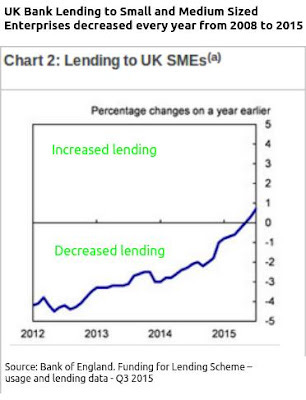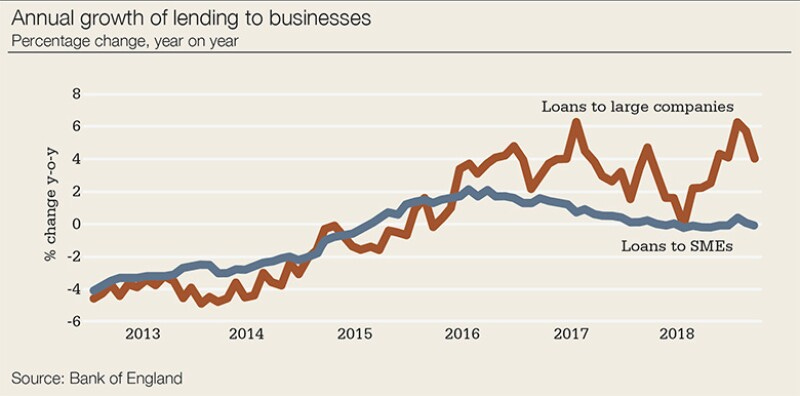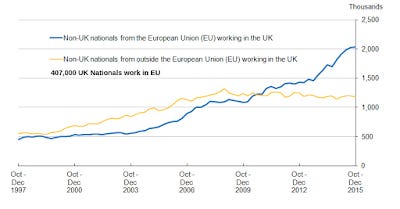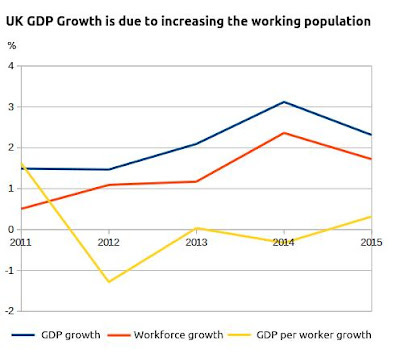The figure of greatest importance to us all is how Real UK incomes have stalled since 2004. “Real” means what the income is worth when price rises are taken into account. As we all know, the government prints money to make it seem like we are all getting richer every year but this drives up prices and nothing has actually changed.
Source: ONS.
The major reason for the static wages is that workers are imported into the UK at a high rate (only c.15% of whom work for care/NHS). If the number of workers increases but you and I do not get any richer what is going on? (See Note 3 below)
This mass import of labour began in 2004 with the government of the UK happily accepting migration from the new states that joined the EU (Romania etc.). However, the government has now become addicted to mass migration to keep down wages for the benefit of employers.
The UK government has opted to increase output by increasing the working population rather than by increasing productivity and hence allowing real earnings growth.
The UK has low productivity growth compared with many other G7 countries:
Source: ONS (Notice the effect of mass migration after 2004). However, see Note 3.
The mass import of workers is not the only problem. The Treasury has allowed very large deficits with the EU. The overall deficit is now about £158 BILLION every year.
Source: ONS
This deficit is due to a trade deficit in both goods and services and a large outflow of rents, profits etc. to EU landlords and corporations. It is still encouraged by the terms of the Withdrawal Agreements from the EU which impose zero tariffs and quotas on most imports . There are no tariffs or quotas on UK-EU Trade so if the UK were failing relative to France or Germany it would also have failed within the EU.
If countries do not pay for their deficits by selling assets or increasing debt the currency crumbles. UK governments have opted to sell houses and businesses to foreign customers to finance the deficit. They proudly boast that the UK is “open for business” which is code for “the UK has few controls on foreign ownership”. Of course, selling assets increases the rents and profits etc. sent to the EU and makes the Balance of Payments Current Account deficit worse in the long run.
The Treasury has also encouraged migration to maintain the property prices at a high level by ensuring high demand for rentals. The Treasury would like the UK to be in the European Economic Area or the EU so that it can sell off the UK more easily. House prices are at record highs as a result of the foreign ownership:
Source: Economics Help
The house price rise after 1997 is due to the rapid increase in population and hence increases in the rental prices needed to encourage property investment. All of this population increase is due to migration and the first generation children of migrants.
This graph shows the close correlation between house prices and net migration:
Three new cities the size of Milton Keynes are needed every year to house migrants and the first generation children of migrants. It is impractical to keep up with the influx of migrants (especially over the last 2 years), if we kept up with the inflow we would end up with the country covered in houses within 50 years.
The reason younger British people cannot afford homes is that the Treasury believes that the Balance of Payments Current Account deficit can be dealt with by selling the country to foreigners and wage rises can be prevented by boosting the supply of labour with migration.
The high migration has changed the composition of the population of the UK, especially in England.
The relatively high birth rate in the New Population of the UK means that by 2030 the English will inevitably become a minority in England (by c.2050-60) as the proportion of White British children decrease by about 1% a year to under 50%.
The increase in population has a serious effect on schools and health provision. That 40% of children in schools are now BAME and half of this increase has occurred in the past 15 years has put a terrible strain on the education system. About 60% of the increased spending in the NHS is due to population growth and all population growth in the UK is due to migration.
Source: Institute of Fiscal Studies. UK Health and Social Care Spending
The message from all this data is that the Treasury is staffed by incompetent economists who can only juggle numbers, they have no idea how to improve productivity. When faced with deficits they sell assets rather than cure the deficits.
The Labour and Conservative Parties have not one original thought between them on how to fix the economy. The answer to fixing the economy is simple: copy countries like China and Singapore. Do not re-enter the EU or join the EEA, we have not changed the terms of trade with the EU since Brexit - the UK-EU Trade Agreement has no tariffs and no quotas. We have continued to have exactly the same pattern of economic growth relative to EU countries as before Brexit:
Trade with the EU is the structural source of our problems. Spain, Italy and France share the problem of high migration but the EU still affects us in other ways because there are few barriers to trade (see Note 1).
Fortunately for the Labour and Conservative Parties the voters tend to accept that migration is the “moral highground” and seem happy to deprive themselves of wages and houses by approving high migration levels.
Note 1: FDI - Foreign Direct Investment
The UK fails to achieve the same returns from FDI as other countries.
Adapted from: http://www.oecd.org/investment/UNITED-KINGDOM-trade-investment-statistical-country-note.pdf
Notice that foreign owned UK companies import much more than they export. This is because EU companies in particular turn their UK subsidiaries into warehouse and assembly operations. Other OECD countries seems to keep a closer watch on investors. They also favour domestic industry and award government contracts to domestic companies.
Some Foreign Owned UK Companies
Abbey National, Alliance & Leicester, Arriva, Associated British Ports, Amersham, Asda, BAA, Bentley cars, Bradford & Bingley, British Oxygen Company, British Plaster Board, British Steel/Corus, British Energy, Cadbury’s, Chloride, Eastern Electricity, English China Clays, Exel, Gatwick Airport, Guardian Royal Exchange, Hanson, Heathrow Airport, House of Fraser, Imperial Chemical Industries, Npower, Kleinwort Benson, Land Rover, Lasmo, London Electricity, Lucas Industries, MG Rover, Midlands Electricity, Morgan Grenfell, O2/Cellnet, Orange, P & Ports, P & O Princess Cruises, Pilkington, Plessey/Marconi, PowerGen, Racal, Redland, Ready Mixed Concrete, Rolls Royce Cars, Rowntree’s, Saatchi & Saatchi, Scottish & Newcastle, Scottish Power, SSE, Smiths Aerospace, South East Water, Southern Water, Sun Life, Thames Water, Tomkins, Trafalgar House/Cunard, United Biscuits, and Warburg SG.
There are also numerous everyday names that are fronts for foreign companies:
EDF, EON, Greater Anglia, Northern Rail, Scotrail, Merseyrail, Docklands Light Railway, Gatwick Express, London Midland, Southern Rail, South Eastern Rail, Thameslink, Gt Northern, TransPennine
Note2: Growth in earnings and inflation
The graph below summarises how the pumping of billions into the economy during COVID (2020-21) led to a blip in earnings then after COVID (2022-23) there was inflation and lowered real wages .
Note 3: Productivity
The UK economy has been losing productivity relative to historical trends since 2008:
The fact that the fall in productivity after 2008 is exactly coincident with the banking crisis shows that it is related to the behaviour of banks (though the banking crash also unmasked falling productivity growth in other sectors). Bank lending to business has been appalling in this period, the total loaned to small and medium sized enterprises decreased in every year from 2008 to mid 2015:
There has been considerable progress in the finance of SMEs since 2014 with the foundation of the British Business Bank (See OECD article). Although since 2016 Small and Medium Sized Enterprises have again lost funding:
Curiously the UK imported a million EU workers from 2008 to 2015. UK businesses seem to have turned to cheap labour because they were unable or unwilling to invest in more productive methods:
This use of cheap labour to increase output is crystal clear when the expansion of the workforce is compared with GDP figures:
The rise in UK GDP is largely an illusion due to increasing the size of the working population. In the past 20 years there have been millions of migrants entering the UK but real GDP per head has been constant. The migrant workers provide just enough input to support themselves, they do not increase ‘our’ wealth at all.
(Source: World Bank )
There is a general myth that migrants all come here to save the NHS and care services, only 16% migrants worked in health/care in 2022:
(The strain on the healthcare services and education is due to migration and the solution used is more migration. Notice that 13% of UK population works in NHS/care which means 13% of a group is needed to care for a group of people. The migrants only contribute 3% to help outside of their group).
The failure to increase productivity is due to using cheap labour imported from overseas rather than investing in plant and automation. Cheap labour is a short term method of maintaining and increasing profits: business owners and managers cannot be expected to invest now if that makes them much less competitive now. The increased use of cheap labour boosts business profits in the short term. It is for governments to care for the future of the economy by introducing policies that are good for the people in the long term, such as limiting migration. Only government can stop the imported labour addiction.
The solution to the productivity problem is to increase bank lending to SMEs (at low interest rates) and reduce the availability of cheap labour. Brexit was an ideal opportunity to fix this problem but the Conservatives stuck to the old high migration - cheap labour model. If migration is not limited businesses will always turn to cheap labour even if there is enough money to increase productivity.
It will also be necessary to amend the Withdrawal Agreement and treat EU owned UK companies in the same way as foreign owned UK companies to ensure that these companies yield the productivity gains that can accompany FDI rather than providing a conduit for imports. The UK must shed its image as a good place for exploiting cheap labour in assembly plants. (See The Damaging Effect of EU Ownership of UK Industry).



